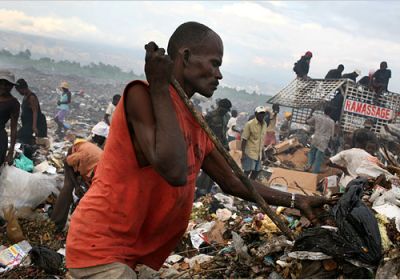
-
 The United States embassy in Haiti worked closely with factory owners contracted by Levi's, Hanes, and Fruit of the Loom to aggressively block a paltry minimum wage rise for Haitian assembly zone workers. The moves to block a wage rise for the lowest paid in the western hemisphere were revealed by secret US State Department cables obtained by Haiti Liberte and The Nation magazine. The factory owners refused to pay $0.62 an hour, or $5 per eight-hour day, as mandated by a measure unanimously passed by Haiti’s parliament in June 2009.
The United States embassy in Haiti worked closely with factory owners contracted by Levi's, Hanes, and Fruit of the Loom to aggressively block a paltry minimum wage rise for Haitian assembly zone workers. The moves to block a wage rise for the lowest paid in the western hemisphere were revealed by secret US State Department cables obtained by Haiti Liberte and The Nation magazine. The factory owners refused to pay $0.62 an hour, or $5 per eight-hour day, as mandated by a measure unanimously passed by Haiti’s parliament in June 2009. -

A subpoena from the Manhattan district attorney on June 3 has added to a growing list of official probes into investment bank and securities firm Goldman Sachs. Reuters said on June 3: “Goldman Sachs Group Inc now faces probes by several government authorities into derivatives trades it executed in late 2006 and 2007. “On Thursday, sources close to the matter said Goldman received a subpoena from the Manhattan district attorney, who joins the Justice Department and the Securities and Exchange Commission in examining Goldman's actions.”
-
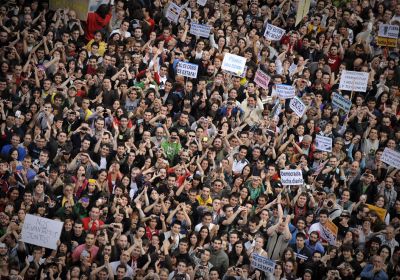
In late April, the progressive Spanish daily Publico asked why there was so little resistance to the economic crisis, despite the country’s 5 million jobless and rising misery.
-
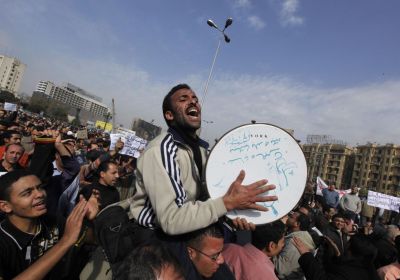 British Conservative PM David Cameron told a May 26 London press conference with US President Barack Obama that the world's biggest superpowers support the “Arab Spring” uprisings. He said the main task of the May 26-27 G8 meeting in Deauville, France the following day was promoting “democracy, freedom and prosperity” in the Middle East. Obama also expressed “solidarity” with the uprisings. “It will be years before these revolutions reach their conclusion, and there will be difficult days along the way”, he said. “Power rarely gives up without a fight.”
British Conservative PM David Cameron told a May 26 London press conference with US President Barack Obama that the world's biggest superpowers support the “Arab Spring” uprisings. He said the main task of the May 26-27 G8 meeting in Deauville, France the following day was promoting “democracy, freedom and prosperity” in the Middle East. Obama also expressed “solidarity” with the uprisings. “It will be years before these revolutions reach their conclusion, and there will be difficult days along the way”, he said. “Power rarely gives up without a fight.” -

On a section of the apartheid wall in Occupied Palestine someone spray-painted a quote from Edward Said that says: "Since when does a militarily occupied people have the responsibility for a peace movement?"
-
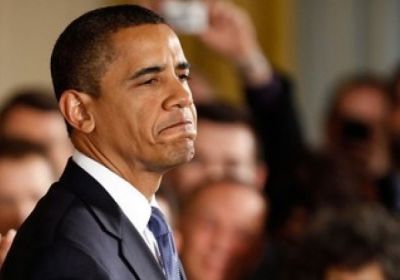
The editor-in-chief of whistle-blowing website WikiLeaks, Julian Assange, told the Belfast Telegraph that the United States was working behind the scenes to put WikiLeaks and himself out of business.
-
“In all of the mainstream media analysis of WikiLeaks' recent release of Detainee Assessment Briefs (DABs) from Guantanamo, relating to almost all of the 779 prisoners who have been held at the prison over the last nine years and four months,” Andy Worthington wrote in a may 11 TruthOut.org article, “one group of prisoners has so far been overlooked: the Yemenis.”
-
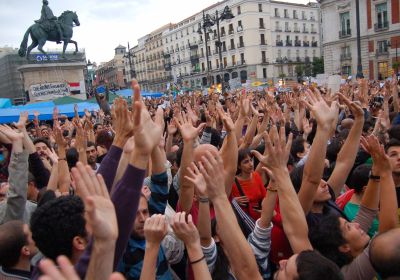 In a contribution to the magazine Viento Sur, Real Democracy Now! activist Nacho Álvarez looked at the challenges facing the Real Democracy Now! movement three weeks after May 15. Excerpts of the article are published below. * * * Collective reflection about what to do, how to channel people’s anger and how to structure a sustained and massive protest movement now grips the streets and squares of hundreds of Spanish cities.
In a contribution to the magazine Viento Sur, Real Democracy Now! activist Nacho Álvarez looked at the challenges facing the Real Democracy Now! movement three weeks after May 15. Excerpts of the article are published below. * * * Collective reflection about what to do, how to channel people’s anger and how to structure a sustained and massive protest movement now grips the streets and squares of hundreds of Spanish cities. -
 Media outlets from the Dawn Media Group, Pakistans leading media house, published the first set of WikiLeaks files relating to Pakistan on May 20. The leaked US cables revealed that the Pakistani military is complicit in US drone strikes in Pakistan's tribal areas, bordering Afghanistan. Each set of cables published by the group has had a ripple effect, with the leaked US cables widely reproduced. At first, embarrassed military spokespeople and politicians exposed by the leaks denied the contents. Later, they tried to ignore them.
Media outlets from the Dawn Media Group, Pakistans leading media house, published the first set of WikiLeaks files relating to Pakistan on May 20. The leaked US cables revealed that the Pakistani military is complicit in US drone strikes in Pakistan's tribal areas, bordering Afghanistan. Each set of cables published by the group has had a ripple effect, with the leaked US cables widely reproduced. At first, embarrassed military spokespeople and politicians exposed by the leaks denied the contents. Later, they tried to ignore them. -
The Scottish government announced on May 20 that it was aiming to use only renewable energy by 2020, EarthTimes.org said on May 22 — increasing its target from 80%. Scotland's First Minister Alex Salmond, from the Scottish National Party (SNP), said: “Because the pace of development has been so rapid, with our 2011 target already exceeded, we can now commit to generating the equivalent of 100% of Scotland's own electricity demand from renewable resources by 2020. “Offshore wind will play a key role in achieving our ambitions.”
-
Tunisia's first election since the downfall of dictator Zine el-Abidine Ben Ali may be delayed from July 24 to October 16, Kamel Jandoubi, president of the High Authority for the Elections, told a meeting of political parties on May 26. But days later, the interim government reaffirmed its commitment to the July 24 elections for a constituent assembly. Moez Sinaoui, spokesperson for the interim prime minister Beji Caid el Sebsi , told state news agency TAP on May 29 that the original date “is a roadmap and a position of principle to prepare this important political event”.
-
 It’s been a year since the “memorandum of understanding” between the International Monetary Fund (IMF) and the Greek government was signed. It is now clear it has failed to deliver the country’s promised economic recovery. As confirmed by the treasury data, Greece’s debt has risen rather than fallen. At the same time, the impact on Greek people of the austerity measures demanded by the IMF has been devastating. Official unemployment has reached about 16% — an all-time high. There are 787,000 people unemployed — 181,000 more than last year.
It’s been a year since the “memorandum of understanding” between the International Monetary Fund (IMF) and the Greek government was signed. It is now clear it has failed to deliver the country’s promised economic recovery. As confirmed by the treasury data, Greece’s debt has risen rather than fallen. At the same time, the impact on Greek people of the austerity measures demanded by the IMF has been devastating. Official unemployment has reached about 16% — an all-time high. There are 787,000 people unemployed — 181,000 more than last year.